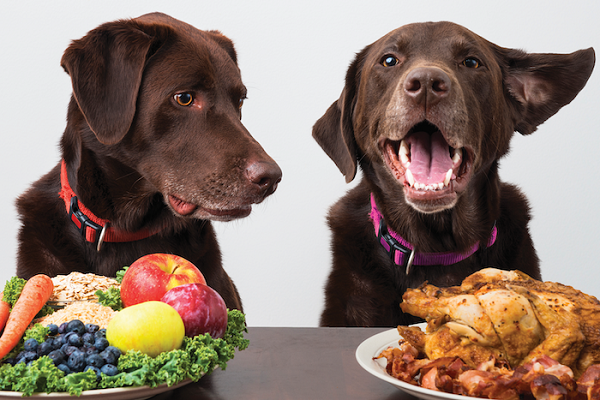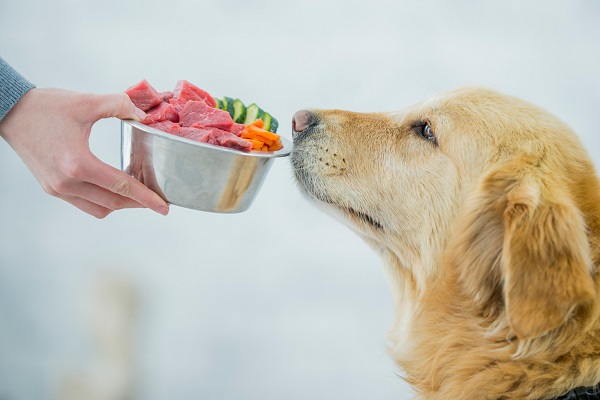Are dogs omnivores or carnivores is a lifelong debate. So let us end it today with the fact that all dogs are omnivores, and neither carnivores nor herbivores.
Dogs can naturally digest meat, as well as grains but contain some carnivores trait and so is often regarded as a carnivore.
This makes it essential to feed them an omnivore diet unless they have meat allergies. Hence knowing more about the dog’s eating habits and requirements are of utmost importance.
So, read on to know more about your pet friend, its physical features, and its evolution with time.

Contents
Are Dogs Omnivores or Carnivores?
The one thing as a pet parent you should know about your dog is they are not complete carnivores. So they don’t necessarily require a high amount of meat in their diet for growth.
But this is still not the exact answer to, “Are dogs Omnivore then?”. Well, it is because 15000 years ago when dogs evolved from timberwolves they had a lot of omnivore traits in them. As they started living with humans they adopted human food quite easily.
They can be fed on plants as well as meat and still can grow healthier. This makes them omnivore and not a carnivore. Unlike cats, dogs don’t just need a high amount of animal protein to grow.
Dogs evolved from wolves so much with time that it has made us confused if they are carnivores or omnivores. But dogs have the ability to digest carbohydrates present in plants and can also digest meat.
But if this is so clear, why are dogs often confused to be carnivores and frequently given just meat?
Why Dogs are Often Confused as Carnivores?
Pets often have different biological needs than humans. For dogs, there are certain biological factors that often make people think that plant-based food can be dangerous. So here are the three reasons why dogs are often confused as carnivores.
No Salivary Amylase
Dogs do not produce salivary amylase like herbivores and omnivores.
They cannot break down starch into glucose as soon as plants enter the mouth.
This is one of the reasons why dogs are confused as carnivores as people believe they can just eat meat and are unable to digest plant protein.
Gray Wolf
Secondly, dogs are considered as subspecies of the gray wolf.
These species live in forests, feed only on other animals.
But it is because of lack of exposure to grains. This makes people assume that dogs are true carnivores and are just born to eat meat.
Eating Pattern
The next reason is dogs can’t chew food from side to side like cows or humans.
They just chop it with the narrow pointed back teeth like most of the carnivores before gulping.
How are Dogs Omnivores?
When you feed plant-based food or meat to your dog, they will easily eat and digest both. Hence your dog can do pretty well with or without meat and other animal products.
As Stated By Purnia “Dogs are omnivores, and even wolves in the wild derive nutrition from both plant and animal sources.“
This was proved when biologists studied the dog’s anatomy and concluded that dogs are omnivores. They can even be called facultative carnivores and not complete carnivores.
But animal protein helps dogs grow healthier. Feeding your dog vegetarian food will likely slow down his growth and weaken his immune system.
Still not assure? Here are three reasons why your dog is an omnivore and not a carnivore.

Reasons Why Dogs are Omnivore
With a lot of confusion going around if dogs are omnivores or carnivores, here are three reasons that will help you get a better understanding of your dog.
Digestion
Dogs have slightly longer intestine compared to carnivores. But also smaller than herbivores as many plants based food products need time to digest.
This makes it easier for dogs to digest plant-based proteins, meat, and other animal products.
Also, dogs can easily create vitamin A from beta carotene that is only found in plants, which carnivores cannot.
Amylase
Unlike carnivores, dogs can produce amylase. It is an enzyme that is added down the digestive tract in the pancreas and small intestine.
It helps break down starch present in plants into glucose.
So amylase in dogs is not present in their mouths like herbivores or omnivores but is present in their digestive tract that breaks starch into glucose.
This makes it easier for dogs to digest plant protein.
Wolves and Grains
Many people consider dogs carnivores because they are descendants of wolves. But surprisingly even wolves are omnivores.
Due to the lack of availability of grains in their habitat, they do not eat grains. But they can eat and digest grains contained in the prey’s stomach.
So your pooch is biologically fit to digest plant-based products as well as meat and animal products. We hope it will surely be easier for you to create a healthy diet for your dog.
Here are a few healthy diet tips you want to consider for your dog’s health.
Tips To Improve your Dog’s Diet
According to aspca “balanced diet is critically important to your dog’s cell maintenance and growth and overall health.” These diet tips will help you understand what is good for your dog’s health and what isn’t. Following them all won’t be that easier, but slowly your dog will surely adapt them all.
- Avoid feeding shelf-stable food to your dog.
- Include fresh whole foods like vegetables and fruits.
- Include meat in dogs diet either half-cooked or raw in adequate amount.
- Avoid rice and wheat or replace them with green lentils.
- Add raw coconut oil as a source of fat to your dog’s diet.
Even these small changes in the dog’s diet will improve his health, with stronger bones and healthy skin and coat.
FAQs
Why are dogs classified as omnivores?
Looking at the dog’s food preferences, behavior and anatomy, they can be classified as omnivores and not carnivores.
Despite being related to wolves, they are living with humans for decades. So have adapted the dietary habits of humans to survive.
Can dogs survive without meat?
Dogs can survive without meat but excluding meat from their diet might lead to a weak immune system and bone density.
It is tough for dogs to digest only plant-based diets. This can create vitamin deficiency.
So it is advisable not to exclude meat from your dog’s diet as animal protein is essential for dogs’ health.
How much meat should dogs eat per day?
That largely depends on dogs’ weight and age. Approximately feed 2% to 3% meat of your dog’s weight daily but make sure to split it between two meals.
Final Notes
To end the confusion and the debate on are Dogs Carnivores or Omnivores, we hope by now you all agree with us that dogs are omnivores and not carnivores. They can easily digest plant proteins as well as require animal protein for survival.
Hence, including an adequate amount of both animal and plant protein is beneficial. It will keep his teeth strong, digestion proper and skin and coat healthy.
Resources:
- Nutritional requirements of dogs — [1]
- Importance of Animal Protein in dogs — [2]
- Diet and Skin allergies in dogs — [3]
- Raw food diets for dogs — [4]
REFERENCE:
- Situ, J. (2023, March 3). What Is the Least Effective Method to Retrieve a Dog That Has Got Off-Leash? DogLikesBest. Retrieved March 3, 2023, from https://www.doglikesbest.com/what-is-the-least-effective-method-to-retrieve-a-dog-that-has-got-off-leash/

Julia is a Board Certified Veterinary Nutritionist, practicing veterinarian in a non-profit animal hospital and feline sanctuary located in Rochester, NY. She is also a full-time veterinary advisor at DogLikesBest. She focuses on writing healthcare-related topics including dog foods, treats, veterinary diets, food for specific healthcare features, etc. Moreover, any article on DogNeedsBest that has to concern feline health in any way, goes under her scrutiny before being published.


